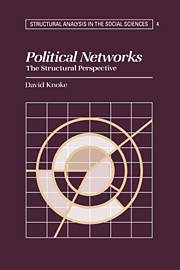Book contents
- Frontmatter
- Contents
- List of tables and figures
- Preface
- Acknowledgments
- 1 Politics in structural perspective
- 2 Voting and political participation
- 3 Social movements (written with Nancy Wisely)
- 4 Organizational power (written with Naomi J. Kaufman)
- 5 Community power structures
- 6 Elites in the nation state
- 7 International relations (written with Jodi Burmeister-May)
- 8 Toward a structural political economy
- Appendix: Some fundamentals of network analysis
- References
- Index
Preface
Published online by Cambridge University Press: 02 October 2009
- Frontmatter
- Contents
- List of tables and figures
- Preface
- Acknowledgments
- 1 Politics in structural perspective
- 2 Voting and political participation
- 3 Social movements (written with Nancy Wisely)
- 4 Organizational power (written with Naomi J. Kaufman)
- 5 Community power structures
- 6 Elites in the nation state
- 7 International relations (written with Jodi Burmeister-May)
- 8 Toward a structural political economy
- Appendix: Some fundamentals of network analysis
- References
- Index
Summary
Structural analysis in its contemporary form is less than two decades old. In that time it has matured from an intellectual social movement to an established specialty spanning several traditional disciplines. Steadily expanding literatures employing the network perspective on social behavior have accumulated. A set of interdisciplinary journals and regular professional meetings in the United States and Europe provide the critical mass to sustain this collective enterprise. Several generations of scholars are concurrently consolidating the oretical and empirical research advances using sophisticated structural analysis concepts, data, and principles. The aim of this book is to enhance the appreciation of structural analysis for improving our knowledge of political phenomena at all levels from primary groups to the world system. The primary audience is other serious scholars who study power with various intellectual tools. We do not assume a great familiarity with sophisticated mathematical techniques, although a brief appendix of technical terms is provided. Rather, we seek to convince our readers at the conceptual level of comprehension and leave to their own discretion how much quantitative depth they wish to acquire from numerous network methodology primers. By making detailed examinations of the roots of structural analysis, its ties to and divergences from alternative theoretical and methodological perspectives, and its contributions to political research, my coauthors and I hope to persuade the members of a wider intellectual community that the network approach to power has much to offer them.
- Type
- Chapter
- Information
- Political NetworksThe Structural Perspective, pp. ix - xPublisher: Cambridge University PressPrint publication year: 1990

